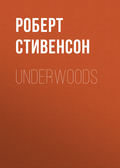
Роберт Льюис Стивенсон
Prince Otto, a Romance
In the inn at Beckstein he remarked, immediately upon his entrance, an intelligent young gentleman dining, with a book in front of him. He had his own place laid close to the reader, and with a proper apology, broke ground by asking what he read.
‘I am perusing,’ answered the young gentleman, ‘the last work of the Herr Doctor Hohenstockwitz, cousin and librarian of your Prince here in Grünewald – a man of great erudition and some lambencies of wit.’
‘I am acquainted,’ said Otto, ‘with the Herr Doctor, though not yet with his work.’
‘Two privileges that I must envy you,’ replied the young man politely: ‘an honour in hand, a pleasure in the bush.’
‘The Herr Doctor is a man much respected, I believe, for his attainments?’ asked the Prince.
‘He is, sir, a remarkable instance of the force of intellect,’ replied the reader. ‘Who of our young men know anything of his cousin, all reigning Prince although he be? Who but has heard of Doctor Gotthold? But intellectual merit, alone of all distinctions, has its base in nature.’
‘I have the gratification of addressing a student – perhaps an author?’ Otto suggested.
The young man somewhat flushed. ‘I have some claim to both distinctions, sir, as you suppose,’ said he; ‘there is my card. I am the licentiate Roederer, author of several works on the theory and practice of politics.’
‘You immensely interest me,’ said the Prince; ‘the more so as I gather that here in Grünewald we are on the brink of revolution. Pray, since these have been your special studies, would you augur hopefully of such a movement?’
‘I perceive,’ said the young author, with a certain vinegary twitch, ‘that you are unacquainted with my opuscula. I am a convinced authoritarian. I share none of those illusory, Utopian fancies with which empirics blind themselves and exasperate the ignorant. The day of these ideas is, believe me, past, or at least passing.’
‘When I look about me – ’ began Otto.
‘When you look about you,’ interrupted the licentiate, ‘you behold the ignorant. But in the laboratory of opinion, beside the studious lamp, we begin already to discard these figments. We begin to return to nature’s order, to what I might call, if I were to borrow from the language of therapeutics, the expectant treatment of abuses. You will not misunderstand me,’ he continued: ‘a country in the condition in which we find Grünewald, a prince such as your Prince Otto, we must explicitly condemn; they are behind the age. But I would look for a remedy not to brute convulsions, but to the natural supervenience of a more able sovereign. I should amuse you, perhaps,’ added the licentiate, with a smile, ‘I think I should amuse you if I were to explain my notion of a prince. We who have studied in the closet, no longer, in this age, propose ourselves for active service. The paths, we have perceived, are incompatible. I would not have a student on the throne, though I would have one near by for an adviser. I would set forward as prince a man of a good, medium understanding, lively rather than deep; a man of courtly manner, possessed of the double art to ingratiate and to command; receptive, accommodating, seductive. I have been observing you since your first entrance. Well, sir, were I a subject of Grünewald I should pray heaven to set upon the seat of government just such another as yourself.’
‘The devil you would!’ exclaimed the Prince.
The licentiate Roederer laughed most heartily. ‘I thought I should astonish you,’ he said. ‘These are not the ideas of the masses.’
‘They are not, I can assure you,’ Otto said.
‘Or rather,’ distinguished the licentiate, ‘not to-day. The time will come, however, when these ideas shall prevail.’
‘You will permit me, sir, to doubt it,’ said Otto.
‘Modesty is always admirable,’ chuckled the theorist. ‘But yet I assure you, a man like you, with such a man as, say, Doctor Gotthold at your elbow, would be, for all practical issues, my ideal ruler.’
At this rate the hours sped pleasantly for Otto. But the licentiate unfortunately slept that night at Beckstein, where he was, being dainty in the saddle and given to half stages. And to find a convoy to Mittwalden, and thus mitigate the company of his own thoughts, the Prince had to make favour with a certain party of wood-merchants from various states of the empire, who had been drinking together somewhat noisily at the far end of the apartment.
The night had already fallen when they took the saddle. The merchants were very loud and mirthful; each had a face like a nor’west moon; and they played pranks with each others’ horses, and mingled songs and choruses, and alternately remembered and forgot the companion of their ride. Otto thus combined society and solitude, hearkening now to their chattering and empty talk, now to the voices of the encircling forest. The starlit dark, the faint wood airs, the clank of the horse-shoes making broken music, accorded together and attuned his mind. And he was still in a most equal temper when the party reached the top of that long hill that overlooks Mittwalden.
Down in the bottom of a bowl of forest, the lights of the little formal town glittered in a pattern, street crossing street; away by itself on the right, the palace was glowing like a factory.
Although he knew not Otto, one of the wood-merchants was a native of the state. ‘There,’ said he, pointing to the palace with his whip, ‘there is Jezebel’s inn.’
‘What, do you call it that?’ cried another, laughing.
‘Ay, that’s what they call it,’ returned the Grünewalder; and he broke into a song, which the rest, as people well acquainted with the words and air, instantly took up in chorus. Her Serene Highness Amalia Seraphina, Princess of Grünewald, was the heroine, Gondremark the hero of this ballad. Shame hissed in Otto’s ears. He reined up short and sat stunned in the saddle; and the singers continued to descend the hill without him.
The song went to a rough, swashing, popular air; and long after the words became inaudible the swing of the music, rising and falling, echoed insult in the Prince’s brain. He fled the sounds. Hard by him on his right a road struck towards the palace, and he followed it through the thick shadows and branching alleys of the park. It was a busy place on a fine summer’s afternoon, when the court and burghers met and saluted; but at that hour of the night in the early spring it was deserted to the roosting birds. Hares rustled among the covert; here and there a statue stood glimmering, with its eternal gesture; here and there the echo of an imitation temple clattered ghostly to the trampling of the mare. Ten minutes brought him to the upper end of his own home garden, where the small stables opened, over a bridge, upon the park. The yard clock was striking the hour of ten; so was the big bell in the palace bell-tower; and, farther off, the belfries of the town. About the stable all else was silent but the stamping of stalled horses and the rattle of halters. Otto dismounted; and as he did so a memory came back to him: a whisper of dishonest grooms and stolen corn, once heard, long forgotten, and now recurring in the nick of opportunity. He crossed the bridge, and, going up to a window, knocked six or seven heavy blows in a particular cadence, and, as he did so, smiled. Presently a wicket was opened in the gate, and a man’s head appeared in the dim starlight.
‘Nothing to-night,’ said a voice.
‘Bring a lantern,’ said the Prince.
‘Dear heart a’ mercy!’ cried the groom. ‘Who’s that?’
‘It is I, the Prince,’ replied Otto. ‘Bring a lantern, take in the mare, and let me through into the garden.’
The man remained silent for a while, his head still projecting through the wicket.
‘His Highness!’ he said at last. ‘And why did your Highness knock so strange?’
‘It is a superstition in Mittwalden,’ answered Otto, ‘that it cheapens corn.’
With a sound like a sob the groom fled. He was very white when he returned, even by the light of the lantern; and his hand trembled as he undid the fastenings and took the mare.
‘Your Highness,’ he began at last, ‘for God’s sake.. ’ And there he paused, oppressed with guilt.
‘For God’s sake, what?’ asked Otto cheerfully. ‘For God’s sake let us have cheaper corn, say I. Good-night!’ And he strode off into the garden, leaving the groom petrified once more.
The garden descended by a succession of stone terraces to the level of the fish-pond. On the far side the ground rose again, and was crowned by the confused roofs and gables of the palace. The modern pillared front, the ball-room, the great library, the princely apartments, the busy and illuminated quarters of that great house, all faced the town. The garden side was much older; and here it was almost dark; only a few windows quietly lighted at various elevations. The great square tower rose, thinning by stages like a telescope; and on the top of all the flag hung motionless.
The garden, as it now lay in the dusk and glimmer of the starshine, breathed of April violets. Under night’s cavern arch the shrubs obscurely bustled. Through the plotted terraces and down the marble stairs the Prince rapidly descended, fleeing before uncomfortable thoughts. But, alas! from these there is no city of refuge. And now, when he was about midway of the descent, distant strains of music began to fall upon his ear from the ball-room, where the court was dancing. They reached him faint and broken, but they touched the keys of memory; and through and above them Otto heard the ranting melody of the wood-merchants’ song. Mere blackness seized upon his mind. Here he was, coming home; the wife was dancing, the husband had been playing a trick upon a lackey; and meanwhile, all about them, they were a by-word to their subjects. Such a prince, such a husband, such a man, as this Otto had become! And he sped the faster onward.
Some way below he came unexpectedly upon a sentry; yet a little farther, and he was challenged by a second; and as he crossed the bridge over the fish-pond, an officer making the rounds stopped him once more. The parade of watch was more than usual; but curiosity was dead in Otto’s mind, and he only chafed at the interruption. The porter of the back postern admitted him, and started to behold him so disordered. Thence, hasting by private stairs and passages, he came at length unseen to his own chamber, tore off his clothes, and threw himself upon his bed in the dark. The music of the ball-room still continued to a very lively measure; and still, behind that, he heard in spirit the chorus of the merchants clanking down the hill.
BOOK II – OF LOVE AND POLITICS
CHAPTER I – WHAT HAPPENED IN THE LIBRARY
At a quarter before six on the following morning Doctor Gotthold was already at his desk in the library; and with a small cup of black coffee at his elbow, and an eye occasionally wandering to the busts and the long array of many-coloured books, was quietly reviewing the labours of the day before. He was a man of about forty, flaxen-haired, with refined features a little worn, and bright eyes somewhat faded. Early to bed and early to rise, his life was devoted to two things: erudition and Rhine wine. An ancient friendship existed latent between him and Otto; they rarely met, but when they did it was to take up at once the thread of their suspended intimacy. Gotthold, the virgin priest of knowledge, had envied his cousin, for half a day, when he was married; he had never envied him his throne.
Reading was not a popular diversion at the court of Grünewald; and that great, pleasant, sunshiny gallery of books and statues was, in practice, Gotthold’s private cabinet. On this particular Wednesday morning, however, he had not been long about his manuscript when a door opened and the Prince stepped into the apartment. The doctor watched him as he drew near, receiving, from each of the embayed windows in succession, a flush of morning sun; and Otto looked so gay, and walked so airily, he was so well dressed and brushed and frizzled, so point-device, and of such a sovereign elegance, that the heart of his cousin the recluse was rather moved against him.
‘Good-morning, Gotthold,’ said Otto, dropping in a chair.
‘Good-morning, Otto,’ returned the librarian. ‘You are an early bird. Is this an accident, or do you begin reforming?’
‘It is about time, I fancy,’ answered the Prince.
‘I cannot imagine,’ said the Doctor. ‘I am too sceptical to be an ethical adviser; and as for good resolutions, I believed in them when I was young. They are the colours of hope’s rainbow.’
‘If you come to think of it,’ said Otto, ‘I am not a popular sovereign.’ And with a look he changed his statement to a question.
‘Popular? Well, there I would distinguish,’ answered Gotthold, leaning back and joining the tips of his fingers. ‘There are various kinds of popularity; the bookish, which is perfectly impersonal, as unreal as the nightmare; the politician’s, a mixed variety; and yours, which is the most personal of all. Women take to you; footmen adore you; it is as natural to like you as to pat a dog; and were you a saw-miller you would be the most popular citizen in Grünewald. As a prince – well, you are in the wrong trade. It is perhaps philosophical to recognise it as you do.’
‘Perhaps philosophical?’ repeated Otto.
‘Yes, perhaps. I would not be dogmatic,’ answered Gotthold.
‘Perhaps philosophical, and certainly not virtuous,’ Otto resumed.
‘Not of a Roman virtue,’ chuckled the recluse.
Otto drew his chair nearer to the table, leaned upon it with his elbow, and looked his cousin squarely in the face. ‘In short,’ he asked, ‘not manly?’
‘Well,’ Gotthold hesitated, ‘not manly, if you will.’ And then, with a laugh, ‘I did not know that you gave yourself out to be manly,’ he added. ‘It was one of the points that I inclined to like about you; inclined, I believe, to admire. The names of virtues exercise a charm on most of us; we must lay claim to all of them, however incompatible; we must all be both daring and prudent; we must all vaunt our pride and go to the stake for our humility. Not so you. Without compromise you were yourself: a pretty sight. I have always said it: none so void of all pretence as Otto.’
‘Pretence and effort both!’ cried Otto. ‘A dead dog in a canal is more alive. And the question, Gotthold, the question that I have to face is this: Can I not, with effort and self-denial, can I not become a tolerable sovereign?’
‘Never,’ replied Gotthold. ‘Dismiss the notion. And besides, dear child, you would not try.’
‘Nay, Gotthold, I am not to be put by,’ said Otto. ‘If I am constitutionally unfit to be a sovereign, what am I doing with this money, with this palace, with these guards? And I – a thief – am to execute the law on others?’
‘I admit the difficulty,’ said Gotthold.
‘Well, can I not try?’ continued Otto. ‘Am I not bound to try? And with the advice and help of such a man as you – ’
‘Me!’ cried the librarian. ‘Now, God forbid!’
Otto, though he was in no very smiling humour, could not forbear to smile. ‘Yet I was told last night,’ he laughed, ‘that with a man like me to impersonate, and a man like you to touch the springs, a very possible government could be composed.’
‘Now I wonder in what diseased imagination,’ Gotthold said, ‘that preposterous monster saw the light of day?’
‘It was one of your own trade – a writer: one Roederer,’ said Otto.
‘Roederer! an ignorant puppy!’ cried the librarian.
‘You are ungrateful,’ said Otto. ‘He is one of your professed admirers.’
‘Is he?’ cried Gotthold, obviously impressed. ‘Come, that is a good account of the young man. I must read his stuff again. It is the rather to his credit, as our views are opposite. The east and west are not more opposite. Can I have converted him? But no; the incident belongs to Fairyland.’
‘You are not then,’ asked the Prince, ‘an authoritarian?’
‘I? God bless me, no!’ said Gotthold. ‘I am a red, dear child.’
‘That brings me then to my next point, and by a natural transition. If I am so clearly unfitted for my post,’ the Prince asked; ‘if my friends admit it, if my subjects clamour for my downfall, if revolution is preparing at this hour, must I not go forth to meet the inevitable? should I not save these horrors and be done with these absurdities? in a word, should I not abdicate? O, believe me, I feel the ridicule, the vast abuse of language,’ he added, wincing, ‘but even a principulus like me cannot resign; he must make a great gesture, and come buskined forth, and abdicate.’
‘Ay,’ said Gotthold, ‘or else stay where he is. What gnat has bitten you to-day? Do you not know that you are touching, with lay hands, the very holiest inwards of philosophy, where madness dwells? Ay, Otto, madness; for in the serene temples of the wise, the inmost shrine, which we carefully keep locked, is full of spiders’ webs. All men, all, are fundamentally useless; nature tolerates, she does not need, she does not use them: sterile flowers! All – down to the fellow swinking in a byre, whom fools point out for the exception – all are useless; all weave ropes of sand; or like a child that has breathed on a window, write and obliterate, write and obliterate, idle words! Talk of it no more. That way, I tell you, madness lies.’ The speaker rose from his chair and then sat down again. He laughed a little laugh, and then, changing his tone, resumed: ‘Yes, dear child, we are not here to do battle with giants; we are here to be happy like the flowers, if we can be. It is because you could, that I have always secretly admired you. Cling to that trade; believe me, it is the right one. Be happy, be idle, be airy. To the devil with all casuistry! and leave the state to Gondremark, as heretofore. He does it well enough, they say; and his vanity enjoys the situation.’
‘Gotthold,’ cried Otto, ‘what is this to me? Useless is not the question; I cannot rest at uselessness; I must be useful or I must be noxious – one or other. I grant you the whole thing, prince and principality alike, is pure absurdity, a stroke of satire; and that a banker or the man who keeps an inn has graver duties. But now, when I have washed my hands of it three years, and left all – labour, responsibility, and honour and enjoyment too, if there be any – to Gondremark and to – Seraphina – ’ He hesitated at the name, and Gotthold glanced aside. ‘Well,’ the Prince continued, ‘what has come of it? Taxes, army, cannon – why, it’s like a box of lead soldiers! And the people sick at the folly of it, and fired with the injustice! And war, too – I hear of war – war in this teapot! What a complication of absurdity and disgrace! And when the inevitable end arrives – the revolution – who will be to blame in the sight of God, who will be gibbeted in public opinion? I! Prince Puppet!’
‘I thought you had despised public opinion,’ said Gotthold.
‘I did,’ said Otto sombrely, ‘but now I do not. I am growing old. And then, Gotthold, there is Seraphina. She is loathed in this country that I brought her to and suffered her to spoil. Yes, I gave it her as a plaything, and she has broken it: a fine Prince, an admirable Princess! Even her life – I ask you, Gotthold, is her life safe?’
‘It is safe enough to-day,’ replied the librarian: ‘but since you ask me seriously, I would not answer for to-morrow. She is ill-advised.’
‘And by whom? By this Gondremark, to whom you counsel me to leave my country,’ cried the Prince. ‘Rare advice! The course that I have been following all these years, to come at last to this. O, ill-advised! if that were all! See now, there is no sense in beating about the bush between two men: you know what scandal says of her?’
Gotthold, with pursed lips, silently nodded.
‘Well, come, you are not very cheering as to my conduct as the Prince; have I even done my duty as a husband?’ Otto asked.
‘Nay, nay,’ said Gotthold, earnestly and eagerly, ‘this is another chapter. I am an old celibate, an old monk. I cannot advise you in your marriage.’
‘Nor do I require advice,’ said Otto, rising. ‘All of this must cease.’ And he began to walk to and fro with his hands behind his back.
‘Well, Otto, may God guide you!’ said Gotthold, after a considerable silence. ‘I cannot.’
‘From what does all this spring?’ said the Prince, stopping in his walk. ‘What am I to call it? Diffidence? The fear of ridicule? Inverted vanity? What matter names, if it has brought me to this? I could never bear to be bustling about nothing; I was ashamed of this toy kingdom from the first; I could not tolerate that people should fancy I believed in a thing so patently absurd! I would do nothing that cannot be done smiling. I have a sense of humour, forsooth! I must know better than my Maker. And it was the same thing in my marriage,’ he added more hoarsely. ‘I did not believe this girl could care for me; I must not intrude; I must preserve the foppery of my indifference. What an impotent picture!’
‘Ay, we have the same blood,’ moralised Gotthold. ‘You are drawing, with fine strokes, the character of the born sceptic.’
‘Sceptic? – coward!’ cried Otto. ‘Coward is the word. A springless, putty-hearted, cowering coward!’
And as the Prince rapped out the words in tones of unusual vigour, a little, stout, old gentleman, opening a door behind Gotthold, received them fairly in the face. With his parrot’s beak for a nose, his pursed mouth, his little goggling eyes, he was the picture of formality; and in ordinary circumstances, strutting behind the drum of his corporation, he impressed the beholder with a certain air of frozen dignity and wisdom. But at the smallest contrariety, his trembling hands and disconnected gestures betrayed the weakness at the root. And now, when he was thus surprisingly received in that library of Mittwalden Palace, which was the customary haunt of silence, his hands went up into the air as if he had been shot, and he cried aloud with the scream of an old woman.
‘O!’ he gasped, recovering, ‘Your Highness! I beg ten thousand pardons. But your Highness at such an hour in the library! – a circumstance so unusual as your Highness’s presence was a thing I could not be expected to foresee.’
‘There is no harm done, Herr Cancellarius,’ said Otto.
‘I came upon the errand of a moment: some papers I left over-night with the Herr Doctor,’ said the Chancellor of Grünewald. ‘Herr Doctor, if you will kindly give me them, I will intrude no longer.’
Gotthold unlocked a drawer and handed a bundle of manuscript to the old gentleman, who prepared, with fitting salutations, to take his departure.
‘Herr Greisengesang, since we have met,’ said Otto, ‘let us talk.’
‘I am honoured by his Highness’s commands,’ replied the Chancellor.
‘All has been quiet since I left?’ asked the Prince, resuming his seat.
‘The usual business, your Highness,’ answered Greisengesang; ‘punctual trifles: huge, indeed, if neglected, but trifles when discharged. Your Highness is most zealously obeyed.’
‘Obeyed, Herr Cancellarius?’ returned the Prince. ‘And when have I obliged you with an order? Replaced, let us rather say. But to touch upon these trifles; instance me a few.’
‘The routine of government, from which your Highness has so wisely dissociated his leisure.. ’ began Greisengesang.
‘We will leave my leisure, sir,’ said Otto. ‘Approach the facts.’
‘The routine of business was proceeded with,’ replied the official, now visibly twittering.
‘It is very strange, Herr Cancellarius, that you should so persistently avoid my questions,’ said the Prince. ‘You tempt me to suppose a purpose in your dulness. I have asked you whether all was quiet; do me the pleasure to reply.’
‘Perfectly – O, perfectly quiet,’ jerked the ancient puppet, with every signal of untruth.
‘I make a note of these words,’ said the Prince gravely. ‘You assure me, your sovereign, that since the date of my departure nothing has occurred of which you owe me an account.’
‘I take your Highness, I take the Herr Doctor to witness,’ cried Greisengesang, ‘that I have had no such expression.’
‘Halt!’ said the Prince; and then, after a pause: ‘Herr Greisengesang, you are an old man, and you served my father before you served me,’ he added. ‘It consists neither with your dignity nor mine that you should babble excuses and stumble possibly upon untruths. Collect your thoughts; and then categorically inform me of all you have been charged to hide.’
Gotthold, stooping very low over his desk, appeared to have resumed his labours; but his shoulders heaved with subterranean merriment. The Prince waited, drawing his handkerchief quietly through his fingers.
‘Your Highness, in this informal manner,’ said the old gentleman at last, ‘and being unavoidably deprived of documents, it would be difficult, it would be impossible, to do justice to the somewhat grave occurrences which have transpired.’
‘I will not criticise your attitude,’ replied the Prince. ‘I desire that, between you and me, all should be done gently; for I have not forgotten, my old friend, that you were kind to me from the first, and for a period of years a faithful servant. I will thus dismiss the matters on which you waive immediate inquiry. But you have certain papers actually in your hand. Come, Herr Greisengesang, there is at least one point for which you have authority. Enlighten me on that.’
‘On that?’ cried the old gentleman. ‘O, that is a trifle; a matter, your Highness, of police; a detail of a purely administrative order. These are simply a selection of the papers seized upon the English traveller.’
‘Seized?’ echoed Otto. ‘In what sense? Explain yourself.’
‘Sir John Crabtree,’ interposed Gotthold, looking up, ‘was arrested yesterday evening.’
‘It this so, Herr Cancellarius?’ demanded Otto sternly.
‘It was judged right, your Highness,’ protested Greisengesang. ‘The decree was in due form, invested with your Highness’s authority by procuration. I am but an agent; I had no status to prevent the measure.’
‘This man, my guest, has been arrested,’ said the Prince. ‘On what grounds, sir? With what colour of pretence?’
The Chancellor stammered.
‘Your Highness will perhaps find the reason in these documents,’ said Gotthold, pointing with the tail of his pen.
Otto thanked his cousin with a look. ‘Give them to me,’ he said, addressing the Chancellor.
But that gentleman visibly hesitated to obey. ‘Baron von Gondremark,’ he said, ‘has made the affair his own. I am in this case a mere messenger; and as such, I am not clothed with any capacity to communicate the documents I carry. Herr Doctor, I am convinced you will not fail to bear me out.’
‘I have heard a great deal of nonsense,’ said Gotthold, ‘and most of it from you; but this beats all.’
‘Come, sir,’ said Otto, rising, ‘the papers. I command.’
Herr Greisengesang instantly gave way.
‘With your Highness’s permission,’ he said, ‘and laying at his feet my most submiss apologies, I will now hasten to attend his further orders in the Chancery.’
‘Herr Cancellarius, do you see this chair?’ said Otto. ‘There is where you shall attend my further orders. O, now, no more!’ he cried, with a gesture, as the old man opened his lips. ‘You have sufficiently marked your zeal to your employer; and I begin to weary of a moderation you abuse.’
The Chancellor moved to the appointed chair and took his seat in silence.
‘And now,’ said Otto, opening the roll, ‘what is all this? it looks like the manuscript of a book.’
‘It is,’ said Gotthold, ‘the manuscript of a book of travels.’
‘You have read it, Doctor Hohenstockwitz?’ asked the Prince.
‘Nay, I but saw the title-page,’ replied Gotthold. ‘But the roll was given to me open, and I heard no word of any secrecy.’
Otto dealt the Chancellor an angry glance.
‘I see,’ he went on. ‘The papers of an author seized at this date of the world’s history, in a state so petty and so ignorant as Grünewald, here is indeed an ignominious folly. Sir,’ to the Chancellor, ‘I marvel to find you in so scurvy an employment. On your conduct to your Prince I will not dwell; but to descend to be a spy! For what else can it be called? To seize the papers of this gentleman, the private papers of a stranger, the toil of a life, perhaps – to open, and to read them. And what have we to do with books? The Herr Doctor might perhaps be asked for his advice; but we have no index expurgatorius in Grünewald. Had we but that, we should be the most absolute parody and farce upon this tawdry earth.’
Yet, even while Otto spoke, he had continued to unfold the roll; and now, when it lay fully open, his eye rested on the title-page elaborately written in red ink. It ran thus:
MEMOIRS
OF A VISIT TO THE VARIOUS
COURTS OF EUROPE,
BY
SIR JOHN CRABTREE, BARONET
Below was a list of chapters, each bearing the name of one of the European Courts; and among these the nineteenth and the last upon the list was dedicated to Grünewald.
‘Ah! The Court of Grünewald!’ said Otto, ‘that should be droll reading.’ And his curiosity itched for it.
‘A methodical dog, this English Baronet,’ said Gotthold. ‘Each chapter written and finished on the spot. I shall look for his work when it appears.’
‘It would be odd, now, just to glance at it,’ said Otto, wavering.
Gotthold’s brow darkened, and he looked out of window.
But though the Prince understood the reproof, his weakness prevailed. ‘I will,’ he said, with an uneasy laugh, ‘I will, I think, just glance at it.’
So saying, he resumed his seat and spread the traveller’s manuscript upon the table.







